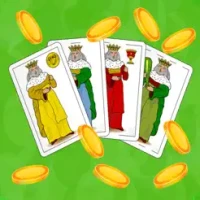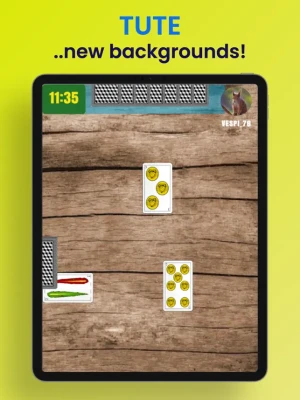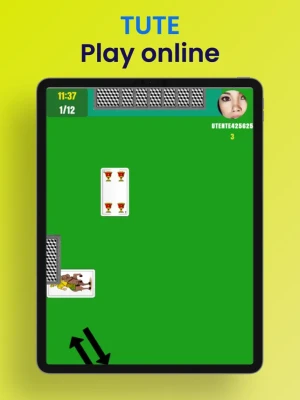
Последняя версия
Версия
1.4
1.4
Апдейт
январь 22, 2025
январь 22, 2025
Разработчик
Multiplayer card game.
Multiplayer card game.
Категории
Игры
Игры
Платформы
iOS Apps
iOS Apps
Размер файла
137 MB
137 MB
Загрузки
0
0
Лицензия
Free
Free
Репорт
Сообщить о проблеме
Сообщить о проблеме
Подробнее о Tute online - Play cards
Tute is a trick-taking card game of the Ace-Ten family for two to four players. Originating in Italy, where it was known as Tutti, during the 19th century the game spread in Spain, becoming one of the most popular card games in the country. The name of the game was later modified by Spanish speakers, who started calling the game Tute. The game is played with a deck of traditional Spanish playing cards, or naipes, that is very similar to the Italian 40-card deck.
The object of the game is to score the most points in the baza (a pile next to a player that contains the cards that the player gets after winning a trick) and by declarations (holding certain combinations of cards).
Tute games are played until an established number of game points is reached. Each time one of the competitors wins a round, one point is added to the total score of the player or pair. New rounds are played until a player or pair reaches the game points goal (three and six point games are the most common). When the number is reached the player or pair wins.
The winner (or the pair of winners) of the round is determined by the total of round points each player (or pair) collects. These points are calculated as the sum of card values in baza, bonus points for declarations and the final trick bonus.
A player (or a pair), who wins at least one trick receives an ability to gain more round points upon declaring the card combinations.
The player, who collected all the four Kings, is entitled to declare tute (all), which automatically ends the round with a collector's victory.
Having both King and Knight of the trump suit, one can declare las cuarenta (forty), scoring additional 40-round points.
The combination of King and Knight of any other suit can be declared as veinte (twenty); it adds 20 round points to the player's score.
If possible, a player can declare several combination. In such cases the declarations with the higher round point value must be made first.
Tute games are played until an established number of game points is reached. Each time one of the competitors wins a round, one point is added to the total score of the player or pair. New rounds are played until a player or pair reaches the game points goal (three and six point games are the most common). When the number is reached the player or pair wins.
The winner (or the pair of winners) of the round is determined by the total of round points each player (or pair) collects. These points are calculated as the sum of card values in baza, bonus points for declarations and the final trick bonus.
A player (or a pair), who wins at least one trick receives an ability to gain more round points upon declaring the card combinations.
The player, who collected all the four Kings, is entitled to declare tute (all), which automatically ends the round with a collector's victory.
Having both King and Knight of the trump suit, one can declare las cuarenta (forty), scoring additional 40-round points.
The combination of King and Knight of any other suit can be declared as veinte (twenty); it adds 20 round points to the player's score.
If possible, a player can declare several combination. In such cases the declarations with the higher round point value must be made first.
Оцените приложение
Добавить комментарий и отзыв
Отзывы пользователей
Основано на 0 reviews
Отзывов пока не добавлено.
Комментарии не будут допущены к публикации, если они являются спамом, оскорбительными, не по теме, содержат ненормативную лексику, содержат личные выпады или разжигают ненависть любого рода.
Ещё »










Популярные приложения!

MarinaСорокин Дмитрий Олегович (@sorydima)

Marina for HUAWEIСорокин Дмитрий Олегович (@sorydima)

MarinaСорокин Дмитрий Олегович (@sorydima)

REChain ®️ 🪐Сорокин Дмитрий Олегович (@sorydima)

Katya ® 👽Сорокин Дмитрий Олегович (@sorydima)

Катя ® 👽Сорокин Дмитрий Олегович (@sorydima)

🎨 Катерина - Профессионал. 🙆Сорокин Дмитрий Олегович (@sorydima)

Катя ® 👽Сорокин Дмитрий Олегович (@sorydima)

REChain ®️ 🪐Сорокин Дмитрий Олегович (@sorydima)

REChain ®️ 🪐Сорокин Дмитрий Олегович (@sorydima)
Ещё »










Выбор редактора

PWA Modus PoS Pro SaaSСорокин Дмитрий Олегович (@sorydima)

Modus PoS Pro SaaSСорокин Дмитрий Олегович (@sorydima)

Marina for HUAWEIСорокин Дмитрий Олегович (@sorydima)

MarinaСорокин Дмитрий Олегович (@sorydima)

Катя ® 👽Сорокин Дмитрий Олегович (@sorydima)

Темпо (Tap Tempo)Сорокин Дмитрий Олегович (@sorydima)

Поросёночек для специалиста!Сорокин Дмитрий Олегович

Поросёночек для хозяинаСорокин Дмитрий Олегович (@sorydima)

Поросёночек для специалиста!Сорокин Дмитрий Олегович (@sorydima)

Delus ® 🐾REChain Network Solutions






















 Web PWA
Web PWA HARMONY OS
HARMONY OS ОС Аврора
ОС Аврора Polkadot
Polkadot Ethereum
Ethereum BNB
BNB Base Blockchain
Base Blockchain Polygon
Polygon Gnosis
Gnosis Arbitrum
Arbitrum Linea
Linea Moonbeam
Moonbeam Aptos
Aptos Solana
Solana